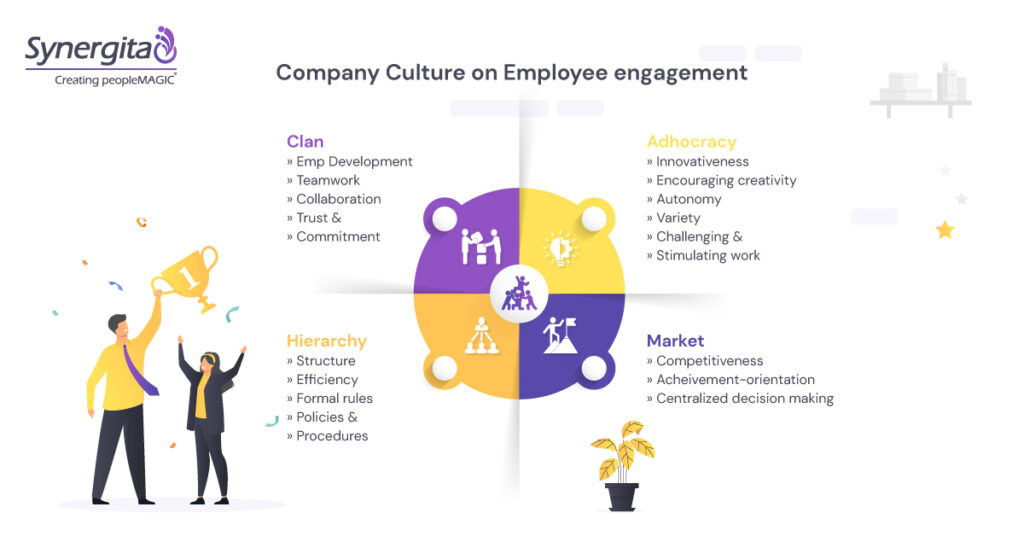Undeniable Influence of Company Culture on Employee Engagement
Undoubtedly, employee engagement directly impacts employee performance and productivity. Employee engagement largely rests on the pillars of company culture. Today, ‘company culture’ has become a popular buzzword in the business world. It is used to describe the shared values, vision, and practices that shape the work environment of a company. With the changing workplace landscape, company culture has become increasingly important in creating an environment that promotes employee engagement.
Engaged employees are more likely to be motivated, productive, and loyal to their employers. As such, it is essential for organizations to create a culture that encourages employee engagement. To do this, companies should focus on creating a space of mutual trust and respect.
But what is company culture, and how does it influence employee engagement? We will discuss the core elements of a company culture and the role it plays in employee development and business growth in an increasingly competitive market.
Defining Company Culture
Company culture is the set of values, practices, and beliefs that define an organization. It is the personality of an organization and reflects the values, goals, and attitudes of the company’s leaders, employees, and customers. It is the essence of the organization and is commonly referred to as the organization’s DNA.
Company culture encompasses everything from how the founding team works to how the office is designed, the dress code, and, most importantly, how employees interact with each other. It determines the decisions made in the company, the authority, and the way the company offers rewards and recognition.
Company culture is closely tied to an organization’s mission, vision, and values. It covers the way a company’s values are expressed through the behaviors and attitudes of its people. Company culture is shaped by the leaders of the organization and the employees who work in it. The shape of the organization is transformed into a collaborative unit moving in the same direction.
Core Elements of a Strong Company Culture
A solid and healthy company culture is essential for the success of any organization. It not only has a positive effect on employee morale but also increases productivity, reduces turnover, and helps to attract and retain top talent. But what exactly are the core elements of a healthy company culture? Let us find out.

- Trust
Employees must trust their colleagues and leaders to do the right thing and make the best decisions for the company. It requires honesty, transparency, and open communication. It also includes how they communicate job expectations and how receptive they are to the feedback from their team.
- Respect
Employees should feel respected and valued for their contributions. Leaders should recognize employees’ work and provide them with the resources and tools they need to do their jobs. They should strive to create a safe and supportive work environment. Respect is fundamental to human dignity and extending it in the workplace ensures inclusivity.
- Collaboration
Employees should feel comfortable working together and sharing ideas. To achieve this, leaders should adopt a structure of adhocracy, i.e., a flat organizational structure and create an atmosphere that encourages creativity, autonomy, and innovation. Nothing cuts through unnecessary bureaucracy like an environment that is flexible and informal.
- Recognition
Employees should feel appreciated and recognized for the work they do. Organizations with a healthy culture will implement recognition and rewards programs to ensure that employees feel incentivized to improve their performance.
- Flexibility
Employees should feel that they have the freedom to work in the way that best suits them. It means that leaders should provide employees with flexibility in how they work, if not when they work, ensuring employees’ work-life balance. Employers who pay attention to work flexibility also ensure zero burnout and peak performance.
- Learning and Development
Offering opportunities for learning and growth is vital to making employees feel encouraged and supported on their journeys toward professional development. It also communicates to employees that their careers are important enough for leaders to invest in the resources they require.
These are the core elements of a healthy company culture. When implemented correctly, they can create a work environment conducive to productivity, collaboration, and success. Additionally, they ensure your organization stands out in a competitive market.
Right Company Culture improves Market Position
With the right company culture, an organization creates an environment that enables a robust support system, offers stimulating work, and is oriented toward achievement and success. It also encourages creativity and innovation in its employees.
The most successful organizations have a solid corporate culture, providing strong leadership, guidance, and resources that empower employees to work together toward common objectives. This, in turn, lends itself to high employee morale, leading to improved performance and productivity. Furthermore, you inculcate employee solidarity, leading to a focused and united workforce.
When employees enjoy their work and are aligned with the organizational values, they are happy and productive, becoming brand ambassadors inside and out. The natural result is a positive reputation in the market that attracts high performers with little to no attrition.

Conclusion
We will reiterate that employee engagement directly impacts employee productivity. Organizations that recognize the value of engaged employees will also work to create a nurturing environment that fosters knowledge. The leaders take great care to ensure that their organizations remain, at their core, employee-centric and achievement-focused. With a strong work culture, you ensure that your organization is perceived as the best place to work in the industry.
You may also like

